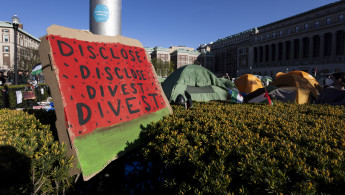US student Gaza protests have been largely peaceful, study finds
The overwhelming majority of US student pro-Palestine campus protests over the Gaza war have been peaceful since they erupted in mid-April, according to a new study.
Over 500 demonstrations have popped up across 36 states, including New York, California, Florida, Georgia and Texas, involving hundreds of students and resulting in over 2,000 arrests.
Despite accusations of widespread violence, US based non-profit organisation, the Armed Conflict Location and Event Data Project (Acled), found that 97 percent of US college student demonstrations between 7 October and 3 May have remained peaceful.
Of the 553 protests analysed by ACLED, fewer than 20 resulted in any serious incidents of violence, whether between protesters and police, counter-protesters, or involving property damage.
The US protest encampments set up in solidarity with Gaza involve students calling for colleges to divest from Israeli-linked companies, cut ties with Israeli universities, and demanding a ceasefire in the seventh-month long war.
The movement sparked imitation protests at universities as far as way as India, as well as in the UK, Ireland and France.
The protests became a major flashpoint in US politics amid accusations of anti-Semitism and fears for the wellbeing of Jewish and Arab students on campus.
College administrations have been facing scrutiny over their response to the demonstrations, which saw college lawns transformed into tented pro-Palestine solidarity gatherings and in one case, students broke into and occupied a university building in protest.
President Joe Biden said that while American principles uphold the right for "people to peacefully assemble," he added that "vandalism, trespassing, breaking windows, shutting down campuses, forcing the cancellation of classes and graduations" is not "peaceful protest".
A particularly ferocious incident occurred at the University of California, Los Angeles, where pro-Palestine demonstrators were violently confronted by pro-Israel supporters on April 30. Masked counter-protesters assaulted students with projectiles and fireworks and attempted to dismantle the encampment during an hours-long assault, all while authorities failed to intervene.
The study noted that California has seen the largest amount of pro-Palestine demonstrations since the war began in October, while New York has recorded the greatest number of pro-Israel demonstrations.
Acled tracks political violence and protest activity around the world in real-time and has been documenting the demonstrations before they made global headlines last month.
The study found that among the 3 percent of campus protests which Acled did constitute as violent, it mostly derived from property damage or confrontations with police forces, and only occasionally marked physical violence between the protesters and counter-protesters.
College administrations have been highly criticised for calling in police to clear encampments which prompted accusations of heavy-handedness towards the students from police and the "militarisation" of campuses.
At Emory University in Georgia on 25 April, two faculty staff were among the two dozen arrested when law enforcement officers clashed with demonstrators.
According to Acled, police intervention against student demonstrations "more than quadrupled in April", with students arrested and crowds physically dispersed. Some reported cases of police using rubber bullets and tear gas against the students.
It added that police have intervened against pro-Palestine demonstrations "more than five and a half times as often as pro-Israel demonstrations".
The most recent round of demonstrations was sparked by the shutdown of a Gaza solidarity encampment at New York's prestigious Columbia University on 18 April, when president Minouche Shafik called in the city's police to clear the encampment which sparked an outcry and resulted in the arrest 108 students.
In the weeks following, classes were forced to transfer online and saw Columbia campus closed to visitors, while student demonstrators broke into and occupied a faculty building.
Since mid-April, there have been more than 2,600 arrests at more than 50 campuses, according to a tally by The Associated Press.




 Follow the Middle East's top stories in English at The New Arab on Google News
Follow the Middle East's top stories in English at The New Arab on Google News
![A group of Palestinians, foreign and Israeli activists gather to participated in an olive picking event on the land in the town of Battir, which is under threat of confiscation by Israel in Bethlehem, occupied West Bank on 8 November 2024. [Getty]](/sites/default/files/styles/image_330x185/public/2182930803.jpeg?h=199d8c1f&itok=__0LgGsa)

![People gathered around the rubble of destroyed houses to search for survivors [Getty]](/sites/default/files/styles/image_330x185/public/2024-11/GettyImages-2184733820.jpg?h=199d8c1f&itok=NiM1LO2f)